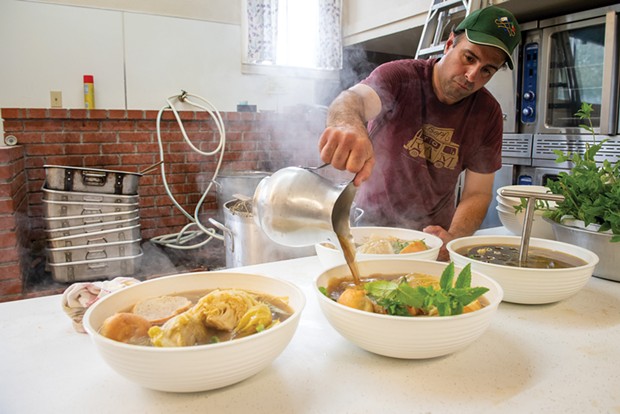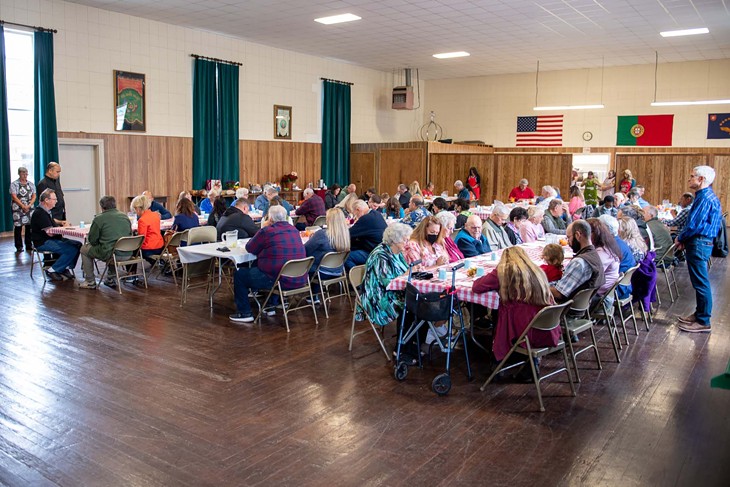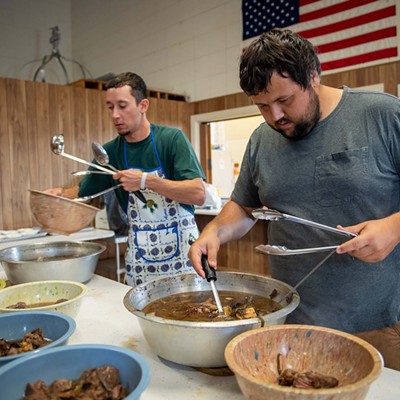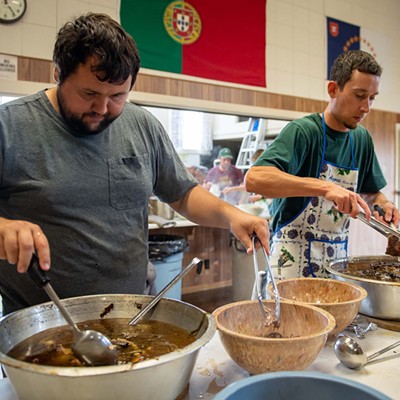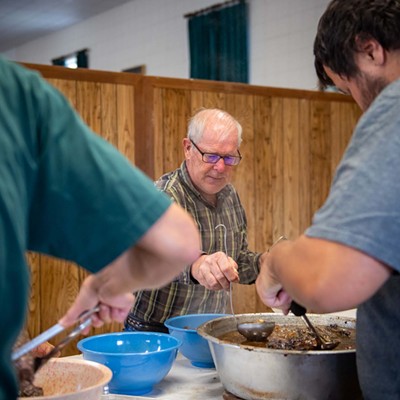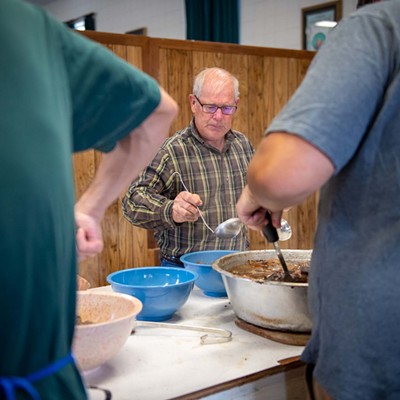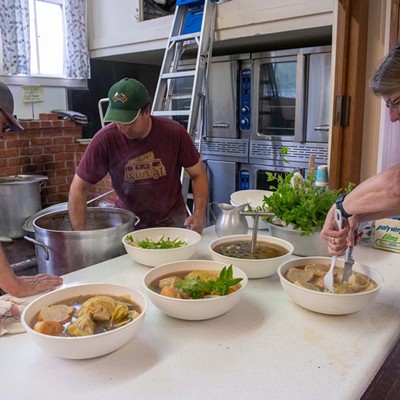Cooking for the Feast
And keeping Portuguese tradition in Ferndale
By Jennifer Fumiko Cahill [email protected] @jfumikocahill[
{
"name": "Top Stories Video Pair",
"insertPoint": "7",
"component": "17087298",
"parentWrapperClass": "fdn-ads-inline-content-block",
"requiredCountToDisplay": "1"
}
]
The farther back you walk into the Portuguese Hall Association, past the rows of people young and old sitting at long tables covered in red gingham cloths, the stronger the aroma of meat, onions, peppercorns and allspice gets. And there behind the divider is its source: a team of volunteer cooks and servers dishing out Portuguese sopas do Espírito Santo and slow-cooked alcatra.
On Sunday, Oct. 10, after a morning Catholic mass for the Feast of Our Lady of Fatima, honoring the day the Virgin Mary is said to have appeared before three children in Portugal, the Portuguese Hall Association of the Eel River Valley fed some 100 people after a two-year hiatus due to the pandemic. Organizers felt ready to try again with a vaccinated crew of volunteers, a spacious hall, open doors and a smaller event than the all-day Pentecost Sunday feast. But even for this lesser celebration, the cooking began the day before.
"Used to be the women years and years ago," says Stephanie Koch, the association's chair, "but now we have men that cook the meat and the traditional sopas." As the older generation of cooks died off, she says, a handful of men stepped up to carry on the tradition and cook the recipes that had been passed down.
One of those men is 72-year-old Steve Lorenzo, a retired dairy technician who was recruited by a cousin some 25 years ago. "He said, 'Well, you know you can't ever quit — you sign up, you have to do it for life,'" Lorenzo recalls with a slightly wheezy laugh. "There's always been a Lorenzo cooking, so I said, 'Yeah.'" He'd gotten an early start, chopping vegetables for his grandmother for community feasts. "My avó used to cook ... and as a kid I used to come all the time."
That's how he learned to make the sopas do Espírito Santo, a regional cabbage soup from the Azores islands, made with bacon and bones, mint and spices, and served over staled bread. Outside that region, to which many of the Portuguese in the Eel River Valley trace their lineage, "Few people have heard of it and fewer than that have tasted it."
After hours of cooking, the bones, bacon and spices have given the broth a tea-brown color. Once the broth is strained, they add wedges of cabbage and mint. This batch uses mint from a volunteer's garden.
"A Portuguese cook always has mint in the garden," says Trish Lorenzo, Steve's wife. She fishes out the limp stems of mint that have done their job and uses a small knife to cut the cores from the wedges of cabbage so the now tender leaves separate into the aromatic broth. The thick slices of French bread floating on top have soaked up the soup to near melting. Her apron, covered in blue and white hydrangeas, remains shockingly unmarred.
Lorenzo, who bought land in the Azores, returns from trips there with hard-to-find ingredients, like dried pimenta doce, a powdered sweet red pepper, as well as tweaks to the recipe. "We can't duplicate the way they cook over there," he says, noting everything from clay pots and wood fired ovens to the meat they use alters the flavor. And not everyone agrees on the best way to cook traditional foods, which are sometimes done differently, depending on which side of the island you're on. "They ridicule each other — 'Oh, those guys over there, they don't know what they're doing,'" he says with a laugh. "The older people who want to do this, it's about preserving the tradition. The younger people just aren't into this, so it's harder to get people to learn or to come."
Kevin Oliveira's ponytail hangs out the back of a green cap and sways across his back as he moves a pot of soup to the pass-through. He started helping out in the hall's kitchen 11 years ago. "They told me it was a lifetime sentence and I'm here and I enjoy doin' it. Preserving our traditions." It's also how he learned to cook the sopas and the alcatra, which requires cooking hunks of beef broken down from a chuck roll for about eight hours in spices and wine. The final product gives easily under a spoon, fragrant and seasoned through. "Yesterday we started at 9:30 and I turned the stoves off at 7:15," he says. On Sunday, the cooks were back at it by 8:30 a.m. with plans to clean and pack up until at least 4 p.m.
"This is the small one," he says, wiping his brow once the food is served. Today's meal took a mere six pans of meat — about 120 pounds —instead of the 36 pans they usually cook for Pentecost Sunday, 50 days after Easter. For that, they cook all night and serve two seatings. Cooking the sopas and alcatra at home just isn't the same, says Oliveira. "You only get this flavor cooking this amount."
After two years without a feed like this, Steve Lorenzo is happy to be back in the kitchen, though he was unsure how many people would show amid a pandemic. "Lotta people were concerned about it," he says, "like my 90-year-old aunt won't be coming but my 92- and 94- year-old aunts are."
At the prep table, a younger pair, Steve's nephew Matthew Lorenzo and Nicholas Fisk, lift the meat from pots of cooking liquid and cut it into chunks for serving. Matthew was not, he informs us with a wry smile, told about the lifetime appointment before joining up.
The last of the loaves of sliced Portuguese sweet bread are shuttled out to the tables to be slathered with butter and eaten with the meat and soup, followed by cups of vanilla ice cream. Steve Lorenzo is taking a break, leaning against the wood paneled wall, when a woman comes up to wish him happy birthday. He'd spent his 72nd birthday the day before hunkered over pots of bubbling soup and beef.
"When you get older than dirt, it doesn't matter," quips Trish, earning a grin from her husband.
Oliveira waves a hand toward Steve. "As long as he's standing, he'll be here."
Jennifer Fumiko Cahill (she/her) is the arts and features editor at the Journal.Reach her at 442-1400, extension 320, or [email protected]. Follow her on Twitter @JFumikoCahill.
Speaking of...
more from the author
-
Hole Food
- Apr 27, 2024
-
SCOTUS on the Homeless, CPH Protest and Local Entertainment
- Apr 26, 2024
-
Look Up for Rooftop Sushi
- Apr 19, 2024
- More »
